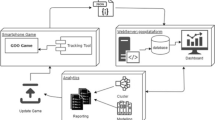Abstract
Purpose
Shop Talk is a therapeutic board game for children and adolescents with cancer, aimed at helping them talk about their disease, life, and emotions in a creative way and in a secure setting. The scope of this study was to translate Shop Talk into Italian, evaluating its acceptability, feasibility, and emotional impact.
Methods
The game board, question cards, and game instructions were translated into Italian from the original English–Spanish version. A sample of 30 pediatric patients aged 7–18 with cancer were enrolled and assigned to one of the following play settings: individual setting, caregiver setting, group setting. The patients’ affectivity was assessed before (T0) and after (T1) the game session using PANAS-C. Acceptability and feasibility were assessed at T1 using a specifically designed questionnaire.
Results
The patients’ acceptability and feasibility perception scores were high. Statistical analyses showed a significant decrease of the negative affect and a significant increase of the positive affect in patients.
Conclusions
The results suggest that the patients involved appreciated the game and its content, purpose, and use. In addition, the game session with Shop Talk had a positive impact on the players’ affectivity. Therefore, Shop Talk can be considered a useful tool for psychologists working with pediatric cancer patients in Italy.



Similar content being viewed by others
References
McCaffrey CN (2006) Major stressors and their effects on the well-being of children with cancer. J Pediatr Nurs 21(1):59–66
Abrams AH, Hazen EP, Penson RT (2007) Psychosocial issues in adolescents with cancer. Cancer Treat Rev 33:622–630
Shaefer C, Reid SE (2001) Game play: therapeutic use of childhood games, 2nd edn. John Wiley & Sons, New York
Li WHC, Chung JO, Ho EKY (2011) The effectiveness of therapeutic play, using virtual reality computer games, in promoting the psychological well-being of children hospitalised with cancer. J Clin Nurs 20:2135–2143
Marcus J (2012) Psychosocial issues in pediatric oncology. Ochsner J 12(3):211–215
Wikstrom BM (2005) Communicating via expressive arts: the natural medium of self-expression for hospitalized children. Pediatr Nurs 31(6):480–485
Carmichael KD (2006) Play therapy: an introduction. Prentice Hall, Glenview, IL
Koukourikos K, Tzeha L, Pantelidou P, Tsaloglidou A (2015) The importance of play during hospitalization of children. Mater Sociomed 27(6):438–441
Li WHC, Chung JO, Ho KY, Chau Kwok BM (2016) Play interventions to reduce anxiety and negative emotions in hospitalized children. BMC Pediatr 16:36
Tobias da Silva SG, Santos MA, de Freitas Floriano CM, Cintra Damião EB, de Campos FV, Rossato LM (2017) Influence of therapeutic play on the anxiety of hospitalized school-age children. Clinical trial. Rev Bras Enferm 70(6):1244–1249
Webb NB (2003) Social work practice with children. Guilford Press, New York
Streng IC (2001) Lifegames. Games children play; when life is not a game. In: Shaefer C, Reid SE (eds) Game play, 2nd edn. Wiley, New York, pp 167–189
Kool R, Lawver T (2010) Play therapy: considerations and applications for the practitioner. Psychiatry (Edgemont) 7(10):19–24
Wiener L, Battles H, Mamalian C, Zadeh S (2011) ShopTalk: a pilot study of the feasibility and utility of a therapeutic board game for youth living with cancer. Support Care Cancer 19(7):1049–1054
Marsac ML, Hildenbrand AK, Clawson K, Jackson L, Kohser K, Barakat L, Alderfer MA (2012) Acceptability and feasibility of family use of the Cellie Cancer Coping Kit. Support Care Cancer 20(12):3315–3324
Guillemin F, Bombardier C, Beaton D (1994) Cross-cultural adaptation of health-related quality of life measures: literature review and proposed guidelines. J Clin Epidemiol 12:1417–1432
Van der Vijver F, Hambleton R (1996) Translating tests: some practical guidelines. Eur Psychol 1(2):89–99
Hambleton R, De Jong JH (2003) Advances in translating and adapting educational and psychological tests. Lang Test 20(2):127–134
Ciucci E, Baroncelli A, Tambasco G, Laurent J, Catanzaro SJ, Joiner TE (2017) Measuring positive affect, negative affect, and physiological hyperarousal among Italian youth: translations of the PANAS-C and PH-C. J Psychopathol Behav Assess 39(3):373–382
Vandelanotte C, Debordeaudhuij I (2003) Acceptability and feasibility of a computer-tailored physical activity intervention using stages of change: project FAITH. Health Educ Res 18(3):304–317
Hedström M, Skolin I, von Essen L (2003) Distressing events for children and adolescents with cancer: child, parent, and nurse perceptions. J Pediatr Oncol Nurs 20(3):120–132
Jantien Vrijmoet-Wiersma CM, van Klink JM, Kolk AM, Koopman HM, Ball LM, Egeler R (2008) Assessment of parental psychological stress in pediatric cancer: a review. J Pediatr Psychol 33(7):694–706
Phipps S, Long A, Willard VW, Okado Y, Hudson M, Huang O, Zhang H, Noll R (2015) Parents of children with cancer: at-risk or resilient? J Pediatr Psychol 40(9):914–925
Acknowledgements
Our thanks go to Dr. Lori Wiener who gave us the opportunity to use the original version of Shop Talk, supported the development of the Italian version, and encouraged this research.
Furthermore, we sincerely thank the Meyer Children’s Hospital Foundation which funded the material creation of the Italian version of Shop Talk based on these results.
Author information
Authors and Affiliations
Corresponding author
Ethics declarations
Conflict of interest
The authors declare that they have no conflict of interest.
Ethical approval
All the procedures in the studies involving human participants were performed in accordance with the ethical standards of the institutional and/or national research committee and with the 1964 Helsinki Declaration and subsequent amendments or comparable ethical standards.
Informed consent
Informed consent was obtained from the individual participants enrolled in the study.
Additional information
Publisher’s note
Springer Nature remains neutral with regard to jurisdictional claims in published maps and institutional affiliations.
Rights and permissions
About this article
Cite this article
Bettini, A., Amore, E., Vagnoli, L. et al. Acceptability and feasibility of a therapeutic board game for children and adolescents with cancer: the Italian version of Shop Talk. Support Care Cancer 27, 4479–4485 (2019). https://doi.org/10.1007/s00520-019-04755-8
Received:
Accepted:
Published:
Issue Date:
DOI: https://doi.org/10.1007/s00520-019-04755-8




